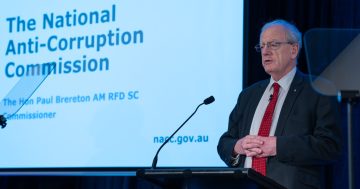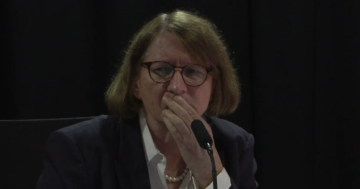
NACC Commissioner, former NSW Court of Appeal judge and major general in the Army Reserve, Paul Brereton Photo: ADF.
The new National Anti-Corruption Commission is open for business, but its inaugural commissioner is warning against the agency being weaponised for political purposes.
Good luck with that.
The commission can expect to be inundated with agenda-driven allegations of corruption and wrongdoing by public officials – elected and otherwise.
Some will have merit while far too many may not, simply because someone is taking aim at a political opponent.
Fortunately, the commissioner has been around the block a few times.
It’s just a pity that he and his staff will have to wade through so much dross in the much-needed campaign against official corruption.
In his first public address as NACC Commissioner, Paul Brereton urged people not to try to weaponise the entity.
Since opening its doors on Saturday, the commission has already received 44 referrals, one against PwC being among them.
The Nationals’ Barnaby Joyce was quick to accuse the Greens of weaponising the commission in asking it to investigate the PwC abuse of confidential Treasury information, as well as a host of other matters.
The consulting giant, however, has provided the perfect example of official behaviour that should be investigated.
On Monday (3 July), the firm named eight senior partners linked to the breach of trust and announced that they had all been dismissed.
The names include the firm’s former chief executive officer Tom Seymour, who had already stepped down.
It’s PwC’s latest attempt to make this all go away.
Good luck with that, too.
Greens Senator Barbara Pocock makes a valid case for why the PwC scandal must be investigated by the national authority, regardless of other investigations underway and anything the firm itself might be doing to mitigate the fallout.
“We need to see the relationships, the behaviours, the individuals involved really brought to account, and it needs the resources and the independence of an organisation like the NACC,” Senator Pocock said.
Meanwhile, Commissioner Brereton – a skilled and credible judge and a war crimes investigator – told a special opening ceremony hearing held in Canberra on Monday that corruption does not always equate to criminality.
The NACC does not make findings of criminal guilt.
“It is important to appreciate that the fact that we decide to commence an investigation does not imply that there is necessarily corrupt conduct,” Commissioner Brereton said.
“It may sometimes be in the public interest that we open an investigation to clear the air, and I will use the power to make public statements about corruption issues to do so.
“Should it be sought to ‘weaponise’ the commission through inappropriate or unfounded referrals, I will not hesitate to use the power to make public statements, if necessary, to avoid unfair damage to reputations and to say that the referral was inappropriate.”
The commissioner said the NACC hopes to complete 90 per cent of referrals within a year and that public hearings would be held in “exceptional circumstances” without stipulating what those circumstances might be.
“The main considerations will be the significance of the alleged corrupt conduct, the desirability of exposing evidence of it, and the appropriateness of public scrutiny of the commission’s activities weighed against any unfair prejudice to a person’s reputation, privacy, safety, or wellbeing that might be caused if the hearing were held in public,” he said.
The commissioner’s first remarks bode well for his goal of wanting the NACC to have a “fearless but fair, independent, and impartial” reputation.
Nothing about the NACC bodes particularly well for PricewaterhouseCoopers, however, and nor should it.
Original Article published by Chris Johnson on Riotact.







